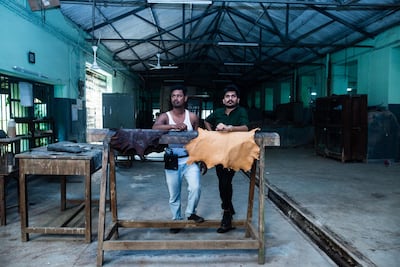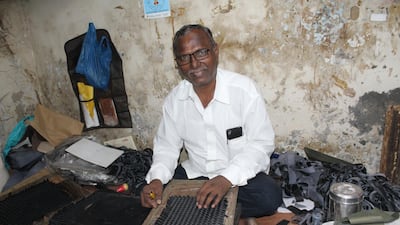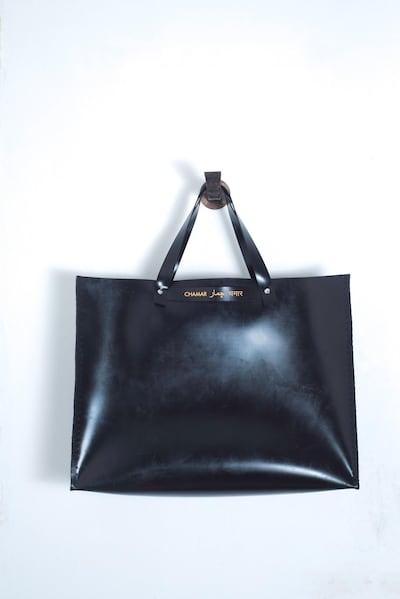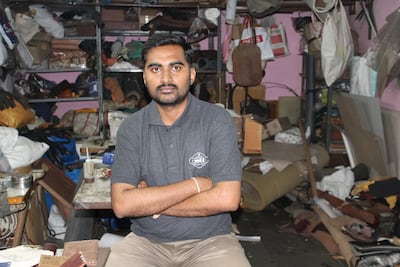With a white cross-body sling bag on his shoulder, Sudheer Rajbhar takes quick strides along the narrow alleys of Dharavi in Mumbai, one of Asia's largest slums. Rajbhar is on his way to a workshop where artisans are referencing designs supplied by him to create products from rubber recycled from tyres. Out to collect a bunch of wallets for an order through his company, Chamar Studio, Rajbhar uses a narrow metal staircase to climb to Sahdev Netke's 250-square-metre workshop, before he breaks for lunch.
Netke, 62, is a Dalit craftsman who moved to Mumbai as a teenager and set up a workshop in Dharavi more than 30 years ago to create leather products. With a population estimated to be more than one million, the area is dotted with shanty homes, many of which double as the humble headquarters of small-scale and cottage enterprises.
For years, Netke earned his living by selling handbags, wallets and other small leather goods to big Indian brands through middlemen. After dropping out of school, he learnt leather work through an acquaintance from the Dalit Chamar community to which he belongs. The community's hereditary profession is leather tanning and most Chamars work at tanneries, create leather goods or ply their trade as cobblers.
However, in some sections of Indian society, the word "Chamar" is used pejoratively and is replaceable with "thief" or "idiot".
"People think that those who work with animal skin are untouchable," Netke says. On his annual visits to his village, for example, he is not permitted to enter the homes of "upper caste" people. "No one likes to eat food cooked by Chamars," he adds.
Rajbhar, an artist who grew up in a Mumbai slum himself, was aware of this denigration of Dalits. As a child, whenever he made a trip to his village in north India, he heard people use Chamar primarily as an expletive. It's where the idea to do something for the shunned community came from. Chamar Studio was created in 2018 after a few artistic endeavours led Rajbhar to think about a sustainable brand for these talented artisans.
In 2017, Rajbhar worked on an installation called Dark Homes for an exhibition at Mumbai's Kala Ghoda Arts Festival, for which he crafted long black tote bags carrying leftovers he had collected from demolished hutments. "The bags were filled with photographs, letters and bricks I found in vacated slums," he says.
Later that year, he curated a show titled We Are Here Because You Are There, to bring attention to the invisible efforts of unskilled labourers, who are the unsung heroes behind the success of many celebrated designers. He crafted a cotton bag for the show – an item he now carries everywhere – with "Chamar" written all over it in different languages. The bag has received a mixed response, he says. "In Mumbai's local trains, my bag gets a lot of stares, but so far no one has asked me anything."
However, in Delhi and other parts of north India, people have expressed their repulsion and even told him outright not to carry the bag. So, of course, he included the word in the name of his company. "I wanted to see how people would respond to a 'Chamar brand' in upscale markets," he says.
Rajbhar contacted like-minded artisans to set up Chamar Studio in their spaces. "Last year, when I collaborated with artisans in the Dharavi and Vakola slums, I found that leather is an expensive raw material," he says. Therefore, alongside his designs, he decided to give the artisans fire-resistant, waterproof and eco-friendly recycled rubber sheets – which he buys from a factory in Vapi, Gujarat – to create the same products they were making with leather. The first Chamar Studio was set up early last year in Sachin Bhima Sakhare's home in Vakola.

Sakhare, 30, is a cobbler whose day job is supervising the waste-management department of the Brihanmumbai Municipal Corporation, the city's governing civic body. He took up the cobbler's suture at the age of 13, when his father died in an accident. Now deft at leatherwork, which he says he loves, Sakhare last year joined forces with Rajbhar for his first Chamar Studio collection, Bombay Black. The first floor of his home has since turned into a workshop where he practises his skills.
Sakhare is accompanied by his team of five waste-management workers. A few of them are also cobblers and earn their living as sweepers, but they are interested in learning the art. There isn't much difference in working with leather and rubber, and Rajbhar's minimalistic designs make the work easier, but every day is a learning curve which further stokes their creativity and interest.
The designs also caught the attention of Suresh Agwane, founder of Made by Dharavi, a brand selling leather accessories created by the slum's leather workers. An engineer who wants to work for the betterment of craftsmen in the community, Agwane says he loved the idea of playing with something cheaper and more eco-friendly.
Chamar Studio's bags are priced from 1,500 rupees to 6,000 rupees (from Dh77 to Dh310) and can be ordered from the brand's social media pages or its website. Multi-designer luxury store Le Mill in Mumbai, Paper Boat Collective in Goa, and Pepper House in Kochi, Kerala, also stock the products. The bags reached Germany recently, through Indian Goods Company, an online store from Frankfurt that sells Indian handicraft.
Rajbhar shares 50 per cent of the sales revenue with the artisans, and has so far approached 75 designers and artists, who will soon provide their own designs to Chamar Studio's teams. They will also promote the goods, while the revenue from the sales will be used to develop the artisans' own Chamar Studios.
"We'll give them a small cutting machine, material and some money to set up the studio in their own spaces," Rajbhar explains.
Some of the artisan-cobblers also work at train stations and Rajbhar says he would like to "set up at railway stations and speak to the millions of commuters each day". It is, after all, a conversation worth having.



